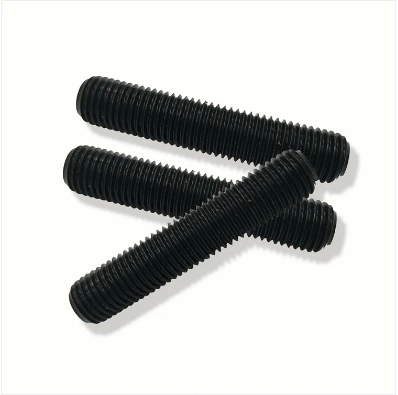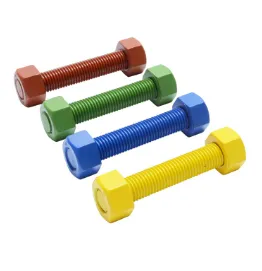FLANGE HEAD BOLTS
Փտր . 20, 2025 10:52 Back to list
FLANGE HEAD BOLTS
Searching for standard bolts can sometimes feel like navigating a vast sea of options, each promising to fulfill your specific needs. Yet, the optimal choice hinges on understanding the fundamentals of bolt types, their materials, and applications. Here's an insightful look into standard bolts, crafted to enhance your understanding and empower your decision-making process in both purchasing and application.
Authenticity and reliability, especially in critical applications, necessitate recognizing certified manufacturers. Trustworthy manufacturers not only comply with local and international standards but also provide product traceability and quality assurances. A certified manufacturer's bolt is not just a component but a promise of integrity and safety, vital in sectors where precision and reliability are non-negotiable. Authoritativeness in the industry comes from decades of innovation, backed by rigorous testing and quality control. Investing in bolts from established brands not only ensures compliance but also enforces a standard of quality that newer, lesser-known brands might lack. Partner with suppliers who invest in research and development to continually enhance their offerings, aligning with emerging technological advancements and environmental policies. Incorporating real-world experiences and expertise into bolt selection can mitigate risks significantly. An industry professional's insight into material fatigue, stress concentration, and corrosion patterns informs decisions that steer projects clear of common pitfalls. For instance, an experienced engineer might recommend galvanizing or coating as a cost-effective alternative to stainless steel in environments prone to rust. Sustainability, increasingly a pivotal consideration, demands a forward-thinking approach. Some manufacturers are leading the charge by introducing eco-friendly production practices and materials. Choosing bolts from such sources not only contributes to sustainability goals but also aligns with new-age business ethics and compliance with environmental regulations. In summary, the realm of standard bolts extends far beyond mere fasteners; they represent a confluence of engineering, material science, and application-specific considerations. A thorough understanding of the material, grade, thread type, and manufacturer reliability is crucial in making informed decisions. Trustworthy partnerships with authoritative suppliers and embracing sustainable practices not only ensure project success but also foster an ecosystem of innovation and responsibility. Whether in the context of commercial manufacturing or individual craftsmanship, an informed choice in standard bolts is foundational to structural integrity and long-term success.


Authenticity and reliability, especially in critical applications, necessitate recognizing certified manufacturers. Trustworthy manufacturers not only comply with local and international standards but also provide product traceability and quality assurances. A certified manufacturer's bolt is not just a component but a promise of integrity and safety, vital in sectors where precision and reliability are non-negotiable. Authoritativeness in the industry comes from decades of innovation, backed by rigorous testing and quality control. Investing in bolts from established brands not only ensures compliance but also enforces a standard of quality that newer, lesser-known brands might lack. Partner with suppliers who invest in research and development to continually enhance their offerings, aligning with emerging technological advancements and environmental policies. Incorporating real-world experiences and expertise into bolt selection can mitigate risks significantly. An industry professional's insight into material fatigue, stress concentration, and corrosion patterns informs decisions that steer projects clear of common pitfalls. For instance, an experienced engineer might recommend galvanizing or coating as a cost-effective alternative to stainless steel in environments prone to rust. Sustainability, increasingly a pivotal consideration, demands a forward-thinking approach. Some manufacturers are leading the charge by introducing eco-friendly production practices and materials. Choosing bolts from such sources not only contributes to sustainability goals but also aligns with new-age business ethics and compliance with environmental regulations. In summary, the realm of standard bolts extends far beyond mere fasteners; they represent a confluence of engineering, material science, and application-specific considerations. A thorough understanding of the material, grade, thread type, and manufacturer reliability is crucial in making informed decisions. Trustworthy partnerships with authoritative suppliers and embracing sustainable practices not only ensure project success but also foster an ecosystem of innovation and responsibility. Whether in the context of commercial manufacturing or individual craftsmanship, an informed choice in standard bolts is foundational to structural integrity and long-term success.
Next:
Latest news
-
Top Wire Bolts Suppliers | AI-Optimized Fast Delivery
NewsAug.02,2025
-
Top Metric Wood Screw Companies | Durable & Reliable
NewsAug.01,2025
-
Premium Lawn Mower Handle Bolts Supplier | Fast Delivery
NewsJul.31,2025
-
Premium Silver Screws Supplier | High-Conductivity Fasteners
NewsJul.31,2025
-
Silver Screws Supplier: High-Quality Fasteners for Various Industries
NewsJul.30,2025
-
Top Spike Wheel Nuts Supplier - High Quality & Custom Options Available
NewsJul.29,2025
